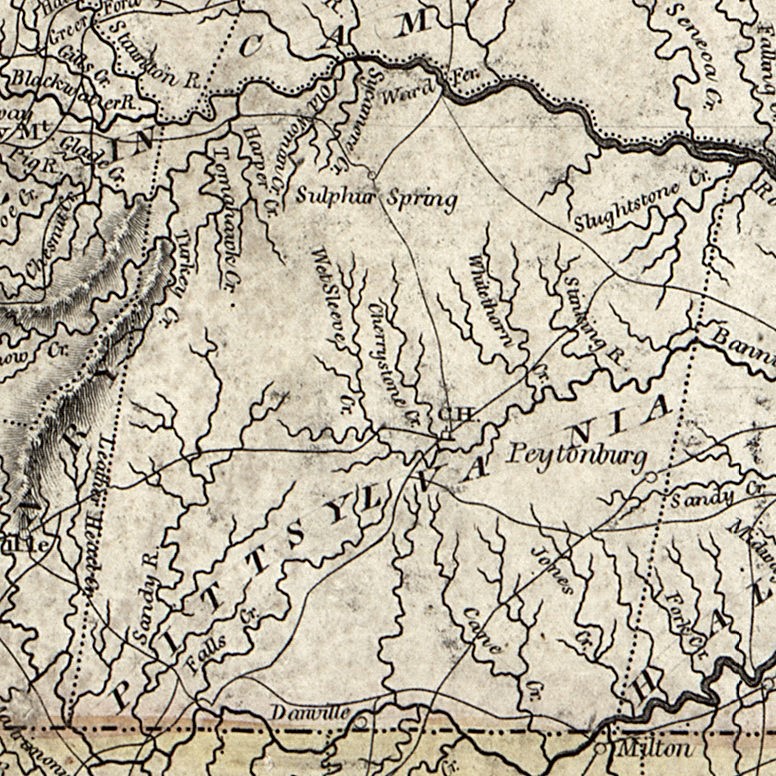
**This research was first published in the March 5, 2025 edition of the Chatham Star-Tribune newspaper as part of Kyle Griffith’s weekly segment entitled “Heritage Highlights.”
1814 Map of Pittsylvania County showing “Sulphur Spring” and Ward’s Ferry near the top
Long before the founding of Gretna, Elba, or the Franklin Junction, the northern section of Pittsylvania County was a vast domain belonging to the Ward family. The original patriarch known as Maj. John Ward was born over three hundred years ago. He and his wife, former Miss Anne Chiles, inhabited a smartly built home called “The Mansion” along the northern side of Staunton River several miles east of modern-day Altavista. They raised a handful of children who became distinguished names within local history. However, Anne passed away in 1765 and he soon remarried to former Miss Sarah Clark, the widow of Maj. Charles Lynch and also the mother to Lynchburg’s founder.
John Ward held several public offices, including Justice of the Peace in Campbell County as well as a Major in the Bedford County Militia. One of Pittsylvania’s earliest roads–Ward’s Road–was surveyed by Maj. Ward and still bears his name today. The road led up to Ward’s Ferry across the Staunton, thence to Lynch’s Ferry across the James River. Around 1810, a toll bridge was constructed across Staunton River called Ward’s Bridge. The area became a community within itself and later established its own post office in 1836. John’s burial site contains a tombstone much newer than the time of his death. The stone indicates that he lived from 1708 until 1816, but it is thought by modern genealogists that he was actually born around 1720. Still, his life was impressively long for his generation.
When researching the Ward family genealogy, many of the same names appear across several generations, last names become first and middle names, and it’s all a little bit confusing. Among Maj. Ward’s children, John Ward Jr. was given about 2,000 acres in northern Pittsylvania including a natural sulfur spring. Before modern medicine, people sought to bathe or drink from the sulfur springs which they believed to have many health benefits. The enterprising Ward family established a hotel at the springs, and a survey of the site exists from the Virginia Historical Inventory. In 1937, Mamie M. Ritter of Gretna detailed “the hotel is said to have been a big frame building, three stories high, with a basement. The ballroom was on the third floor.” She mentioned “a number of cabins” used by guests situated between the hotel and the springs. Since John Ward Jr. never married or had children, the sulfur springs property was left to his nephew Dr. Lynch Dillard in 1825. Ritter’s survey states that Dr. Dillard lived in the hotel as his private residence and office to treat patients for about twenty-three years. In 1848 the land was left to his son Edward H. Dillard, who also resided in the old hotel and appeared on census records as a farmer.
During the Civil War, Edward Dillard found a substitute named Jeremiah Talbott to fight in his place. While over the age of fifty, Jeremiah survived the war and upon his return was paid with land by Mr. Dillard. During the 1870s, part of Jeremiah’s land was used to construct the Lynchburg and Danville Railroad, which opened up a world of new economic opportunities for the area. He segmented and sold off land to other enterprising men such as Hunt Tardy who established the Elba Post Office, and Thomas C. Creasy, another influential merchant and postmaster in the early days. There was also a depot station about three-fourths of a mile south of Elba that operated as Ward’s Springs Post Office until 1887.
As far as the legacy of the sulfur spring goes, its location now lies within the town of Gretna. In the 1930s, one spring was described as having “very fine sulphur water” and another one eight feet away was said to contain copper. There is probably not much to find in its place today, but I have not explored the site myself. Maj. John Ward’s descendants married into other renowned families like the Smiths of “The Pocket,” also Calland, Rutledge, Pigg, Adams, and Leftwich. From a couple thousand acre frontier resort to a little old depot town, the history of Pittsylvania’s sulfur springs is an interesting and obscure cornerstone of the county’s history.

